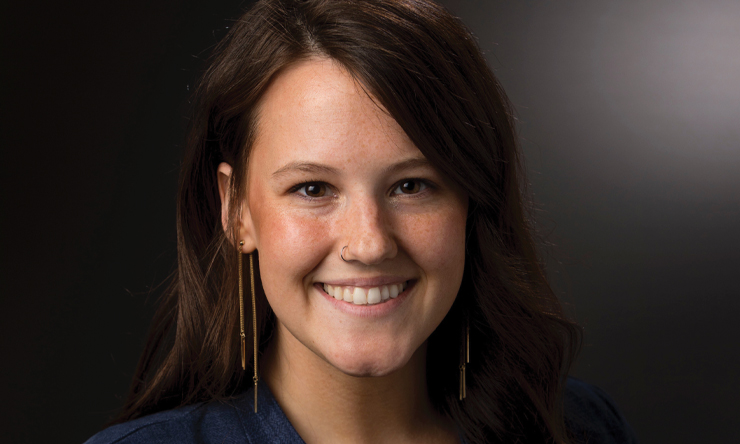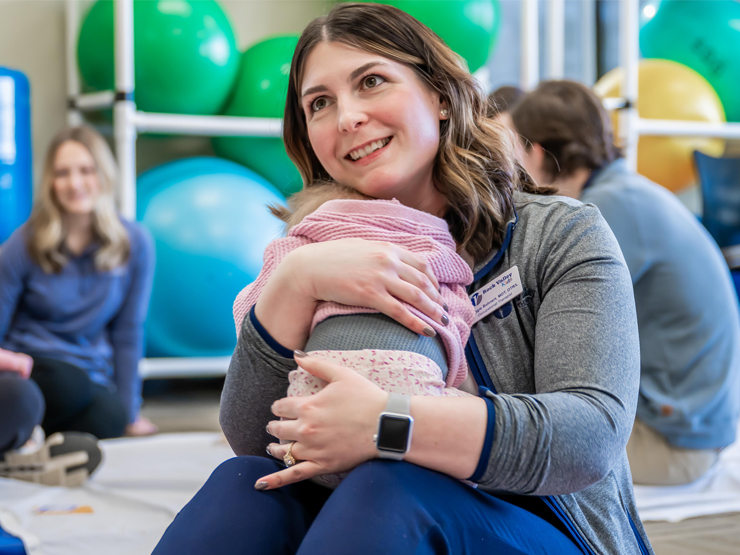Knocking down silos and finding opportunities for collaboration in providing care for the "whole person" has been a central part of Julie Solomon's career.
Injecting the concept of social justice - a principle core value of St. Ambrose University- into the process was fundamental to her work as well.
"I have spent the last 10 years doing a lot of work at the intersection of justice and behavioral health," noted Solomon, who recently joined St. Ambrose as the executive director of the Institute for Person-Centered Care (IPCC). "That work was really about bringing person-centered care to what has traditionally been a siloed system."
Prior to joining the IPCC, Solomon lived in Kansas City, Kansas, and was chief administrative officer at CIT International, an organization that promotes best practices in responding to a behavioral health crisis. She previously was vice president of Emergency Stabilization Services at the Wyandot Community Mental Health Center in Kansas City, Kansas.
"I worked with persons struggling with health issues, facing housing challenges, economic challenges, involved in the criminal justice system and, often, dealing with mental health and substance abuse issues," she said. "It really helps shape how we do business in terms of making it center around the person and treating people with dignity and respect. And, really, focusing on what the person wants and not what I want or what the health care provider wants or what the judge wants.
"That concept really transformed my work."
Person-centered care empowers the person to direct the work of integrated, inter-professional teams of health and human service professionals to achieve outcomes desired by the person. The IPCC was formed a year ago to serve as an incubator for new means of delivering health care, and Solomon's experience in behavioral health care and the criminal justice system's response to mental health issues will ensure those pieces of person-centered care are built into the delivery models Institute develops.
As executive director, Solomon will work with partners deeply involved in health care, behavioral health care and criminal justice practice from throughout the QC region. Partners also include social work and law enforcement professionals on both sides of the river, as well as partner institutions such as Genesis Health Systems, UnityPoint Trinity Health Systems and the Quad Cities Health Initiative.
Building the interstate collaboration the IPCC will need to achieve its mission is not a daunting challenge for Solomon. She spent four years watching her husband, Mark, work across state lines as mayor of Kansas City, Kansas.
"Mark and Sly James, the mayor of Kansas City, Missouri, had a collaborative relationship and did a lot of great work together," she noted. "When you're operating in siloes, whether it's a city or an organization or systems of any sort, it's not generally good for anybody."
Hence, Solomon is attracted to the team-centered delivery model the IPCC is seeking to perfect, starting with the many degree programs in the College of Health and Human Services at St. Ambrose. It is the ability to bring together students from disciplines such as physician assistant studies, physical therapy, occupational therapy, social work, nursing and speech-language pathology to develop collaborative modes of care that makes St. Ambrose an ideal location for the IPCC.
Likewise, Solomon said, "One thing I think creates a lot of opportunity is that the Quad Cities is perfectly sized to create and launch an institute that hopefully can be replicated in other parts of the country."
Solomon plans to enlist a layered approach she calls "an archeological dig" to take the IPCC from conceptual to practical.
"Start building relationships, start talking with people, explore the research and that sort of uncovers what comes next," she said. "I love to meet with people, work with people, see what works, see what's not working and determine how we can make it work better together."
Tom Higgins '67, a thought leader and early proponent of person-centered care, is the founding donor and driving force behind the IPCC. He's eager to see what Solomon can build.
"I'm very excited that Julie is the new executive director of the IPCC," he said. "She brings a track record of real community leadership on one of the most important elements of our mission: mental and behavioral health. How we integrate that with medical care for the benefit of person-centered care is at the heart of the transformation we seek. Her passion and commitment will make an enormous difference."
Sandra Cassady, PT, PhD, dean of the College of Health and Human Services, described Solomon as "the ideal person to be leading the Institute" because of her experience in executive leadership and in growing innovation in behavioral health at the local and national level.
"Her collaborative approach has already proved beneficial as she has started to engage stakeholders and plan future IPCC events," Cassady said.
News
Share This Story



